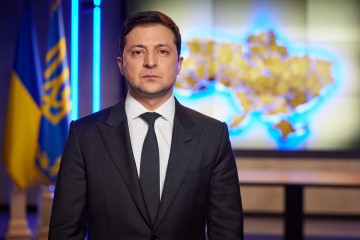Russia has claimed that parts of a peace deal with Ukraine are close to being agreed with “neutral” status for Kyiv under “serious” consideration, according to MailOnline.
But Ukraine has not confirmed it is willing to discuss neutrality. It says it is ready to negotiate to end the war, but not to surrender or accept Russian ultimatums.
A Ukrainian negotiator said a model of legally binding security guarantees that would offer Ukraine protection from a group of allies in the event of a future attack was “on the negotiating table”.
“What does this mean? A rigid agreement with a number of guarantor states undertaking clear legal obligations to actively prevent attacks,” negotiator Mykhailo Podolyak said on Twitter.
It comes a day after Ukrainian President Vlodymyr Zelensky said his country must accept it will not become a member of NATO – a statement which was expected to pave the way for some kind of peace deal with Russia.
Foreign Minister Sergei Lavrov told RBC news today that neutrality was being “seriously discussed” and suggested it would be an acceptable compromise for the Kremlin.
He said that President Vladimir Putin had spoken about neutrality, along with security guarantees for Ukraine without NATO enlargement, as one possible variant in February.
Separately, Moscow’s lead negotiator Vladimir Medinsky said his delegation was pushing for Ukraine to assume a status comparable Sweden or Austria, two neutral countries in western Europe – though Zelensky has rejected the proposal.
Medinsky said, “We need a peaceful, free, independent Ukraine, neutral – not a member of military blocs, not a member of NATO.”
The two sides have held several rounds of negotiations aimed at finding common ground and bringing the hostilities launched by Russian leader Vladimir Putin in late February to a halt.
Both sides had earlier raised hopes of a breakthrough, referring to agreements that were close to being put to paper and signed.
Lavrov today cautioned that the negotiations were not easy but that there was “some hope of reaching a compromise”.
Russia’s negotiator Medinsky echoed the line to reporters on Wednesday that talks were “slow and difficult” but said the Kremlin wants peace, “as soon as possible”.
He reiterated that the core issue at the talks is a “neutral” Ukraine, citing the status of Austria and Sweden as possible examples to follow.
It would mean Ukraine could retain its armed forces but that Kyiv would not be allowed to have any foreign bases, according to Kremlin spokesperson Dmitry Peskov.
“A whole range of issues tied with the size of Ukraine’s army is being discussed”, Medinsky said, having earlier mentioned the sides are discussing an idea for a future Ukraine with a smaller, non-aligned military.
Medinsky added that other issues were being discussed, including the status of the Crimean peninsula, annexed by Russia in 2014, as well as territories held for years by pro-Moscow separatists.
Lavrov today said the list of priorities included the security of people in eastern Ukraine, the demilitarisation of Ukraine and the rights of Russian-speaking people in Ukraine.
Ukrainian officials have also made cautious positive statements about the status of peace talks. Zelensky today described the negotiations as “more realistic” but warned that more time was needed for any deal to be in the interests of Ukraine.
Zelensky made the early morning statement after his team said a peace deal that will end Russia’s invasion of Ukraine will be struck with Vladimir Putin within one or two weeks because Russian forces will run out of fresh troops and supplies by then.
The apparent breakthrough has come a day after Zelensky appeared to confirm that Ukraine will not join NATO.
Speaking yesterday, he said that “we have heard for years that the doors were open, but we also heard that we could not join. It’s a truth and it must be recognised.”
Ahead of the invasion, Putin had been demanding guarantees that Ukraine would never be admitted to NATO along with the removal of all the alliance’s troops and weapons from ex-Soviet countries.
After being rebuffed by Kyiv, Washington and NATO, Putin said there was no option but to launch the military operation because Russian-speaking people in Ukraine had been subjected to genocide by “nationalists and neo-Nazis” since Russia’s 2014 annexation of Crimea.
Russian negotiators have softened their stance a little since then, saying they want Ukraine to declare neutrality, disarm, recognise Crimea as part of Russia and recognise the whole of the Donbass as independent.
Ukraine has been demanding a ceasefire and the immediate withdrawal of all Russian forces.
0





